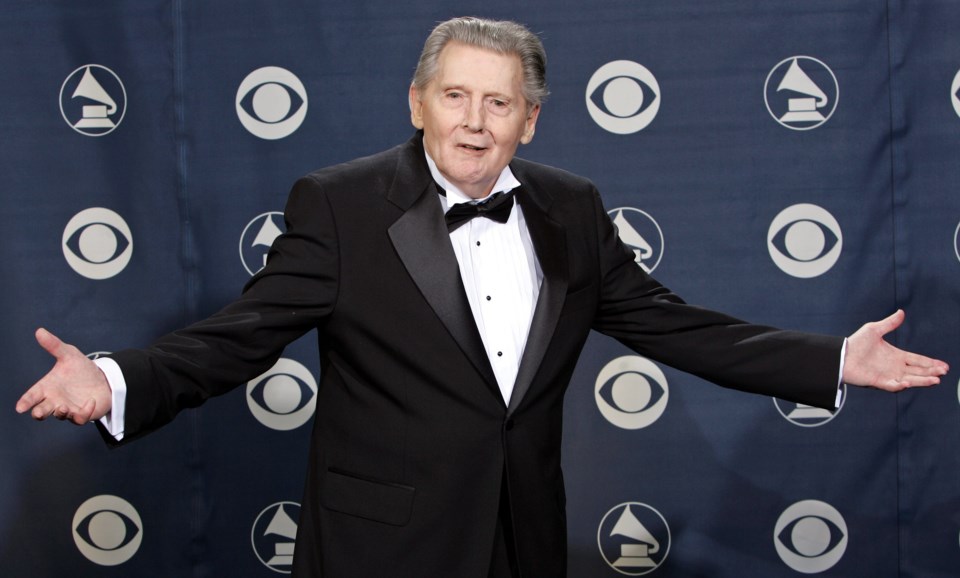the untamable rock вҖҳnвҖҷ roll pioneer whose outrageous talent, energy and ego collided on such definitive records as вҖңGreat Balls of FireвҖқ and вҖңWhole Lotta Shakin' Goin' On" and sustained a career otherwise upended by personal scandal, died Friday morning at 87.
The last survivor of a generation of groundbreaking performers that included Elvis Presley, Chuck Berry and Little Richard, Lewis died at home south of Memphis, Tennessee, representative Zach Farnum said in a release. The news came two days after the publication of an erroneous TMZ report of his death, later retracted.
Of all the rock rebels to emerge in the 1950s, few captured the new genre's attraction and danger as unforgettably as the Louisiana-born piano player who called himself вҖңThe Killer."
He was a one-man stampede who made the fans scream and the keyboards swear, his live act so combustible that during a 1957 performance of вҖңWhole Lotta Shakin' GoinвҖҷ OnвҖқ on вҖңThe Steve Allen Show,вҖқ chairs were thrown at him like buckets of water on an inferno.
But in his private life, he raged in ways that might have ended his career today вҖ” and nearly did back then.
For a brief time, in 1958, he was a contender to replace Presley as rockвҖҷs prime hit maker after Elvis was drafted into the Army. But while Lewis toured in England, the press learned three damaging things: He was married to 13-year-old (possibly even 12-year-old) Myra Gale Brown, she was his cousin, and he was still married to his previous wife. His tour was canceled, he was blacklisted from the radio and his earnings dropped overnight to virtually nothing.
Lewis reinvented himself as a country performer in the 1960s, and the music industry eventually forgave him, long after he stopped having hits. He won three Grammys, and recorded with some of the industry's greatest stars. In 2006, Lewis came out with вҖңLast Man Standing,вҖқ featuring Mick Jagger, Bruce Springsteen, B.B. King and George Jones. In 2010, Lewis brought in Jagger, Keith Richards, Sheryl Crow, Tim McGraw and others for the album вҖңMean Old Man.вҖқ
Lewis married seven times, and was rarely far from trouble or death. His fourth wife, Jaren Elizabeth Gunn Pate, drowned in a swimming pool in 1982 while suing for divorce. His fifth wife, Shawn Stephens, 23 years his junior, died of an apparent drug overdose in 1983. Within a year, Lewis had married Kerrie McCarver, then 21. She filed for divorce in 1986, accusing him of physical abuse and infidelity. He countersued, but both petitions eventually were dropped. They finally divorced in 2005 after several years of separation. The couple had one child, Jerry Lee III.
Another son by a previous marriage, Steve Allen Lewis, 3, drowned in a swimming pool in 1962, and son Jerry Lee Jr. died in a traffic accident at 19 in 1973. Lewis also had two daughters, Phoebe and Lori Leigh, and his survived by his wife, Judith.
Lewis was born in Ferriday, Louisiana. As a boy, he first learned to play guitar, but found the instrument too confining. His life changed when his father pulled up in his truck one day and presented him a dark-wood, upright set of keyboards.
вҖңMy eyes almost fell out of my head,вҖқ Lewis recalled in вҖңJerry Lee Lewis: His Own Story,вҖқ written by Rick Bragg and published in 2014.
He took to the piano immediately, and began sneaking off to Black juke joints and absorbing everything from gospel to boogie-woogie. Lewis briefly attended a fundamentalist Bible college, but was expelled, reportedly, for playing the вҖңwrongвҖқ kind of music.
вҖңGreat Balls of FireвҖқ and вҖңWhole Lotta ShakinвҖҷвҖқ were his most enduring songs and performance pieces. Lewis had only a handful of other pop hits, including вҖңHigh School ConfidentialвҖқ and вҖңBreathless,вҖқ but they were enough to ensure his place as a rock вҖҳnвҖҷ roll architect.
вҖңNo group, be it (the) Beatles, Dylan or Stones, have ever improved on вҖҳWhole Lotta ShakinвҖҷвҖҷ for my money,вҖқ John Lennon would tell Rolling Stone in 1970.
A roadhouse veteran by his early 20s, Lewis took off for Memphis in 1956 and showed up at the studios of Sun Records, the musical home of Elvis, Perkins and Cash. Told by company founder Sam Phillips to go learn some rock вҖҳn roll, Lewis returned and soon hurried off вҖңWhole Lotta ShakinвҖҷвҖқ in a single take.
In 1986, along with Elvis, Chuck Berry and others, he made the inaugural class of inductees for the Rock & Roll Hall of Fame and this year. The Killer not only outlasted his contemporaries but saw his life and music periodically reintroduced to younger fans, including the the 1989 biopic вҖңGreat Balls of Fire,вҖқ starring Dennis Quaid, and A 2010 Broadway music, вҖңMillion Dollar Quartet,вҖқ was inspired by a recording session that featured Lewis, Elvis, Carl Perkins and Johnny Cash.
He won a Grammy in 1987 as part of an interview album that was cited for best spoken word recording, and he received a lifetime achievement Grammy in 2005. The following year, вҖңWhole Lotta ShakinвҖҷвҖқ was selected for the Library of CongressвҖҷ National Recording Registry.
Hillel Italie, The Associated Press



